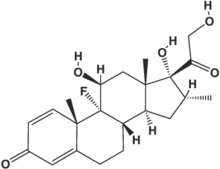Dexacort
Dexamethasone is a synthetic member of the glucocorticoid class of hormones. It acts as an anti-inflammatory and immunosuppressant. Its potency is about 40 times that of hydrocortisone. more...
Therapeutic use
Dexamethasone is used to treat many inflammatory and autoimmune conditions, e.g., rheumatoid arthritis. It is also given to cancer patients undergoing chemotherapy, to counteract certain side-effects of their antitumor treatment. Dexamethasone can augment the antiemetic effect of 5-HT3 receptor antagonists like ondansetron.
In brain tumours (primary or metastatic), dexamethasone is used to counteract the development of edema, which could eventually compress other brain structures. Dexamethasone is also given in cord compression where tumor is compressing the spinal cord.
Dexamethasone is also used in certain hematological malignancies, especially in the treatment of multiple myeloma, in which dexamethasone is given alone or together with thalidomide (thal-dex) or a combination of Adriamycin and vincristine (VAD).
It is useful to counteract allergic shock, if given in high doses. It is present in certain eye drops and as a nasal spray (Dexacort®).
Diagnostic use
Dexamethasone is also used in a diagnostic context, namely in its property to suppress the natural pituitary-adrenal axis. Patients presenting with clinical signs of glucocorticoid excess (Cushing's syndrome) are generally diagnosed by a 24-hour urine collection for cortisol or by a dexamethasone suppression test. During the latter, the response of the body to a high dose of glucocorticoids is monitored. Various forms are performed. In the most common form, a patient takes a nightime dose of either 1 or 4 mg of dexamethasone, and the serum cortisol levels are measured in the morning. If the levels are relatively high (over 5 μg/dl or 150 nmol/l), then the test is positive and the patient has an autonomous source of either cortisol or ACTH, indicating Cushing's syndrome. Longer versions rely on urine collections on oral dexamethasone over various days.
Contraindications
Some of these contraindications are relative:
- Existing gastrointestinal ulceration
- Cushing's syndrome
- Severe forms of heart insufficiency
- Severe hypertension
- Uncontrolled diabetes mellitus
- Systemic tuberculosis
- Severe systemic viral, bacterial, and fungal infections
- Preexisting wide angle glaucoma
- Osteoporosis
Side effects
If dexamethasone is given orally or by injection (parenteral) over a period of more than a few days, side-effects common to systemic glucocorticoids may occur. These may include:
- Stomach upset, increased sensitivity to stomach acid to the point of ulceration of esophagus, stomach, and duodenum
- Increased appetite leading to significant weight gain
- A latent diabetes mellitus often becomes manifest. Glucose intolerance is worsened in patients with preexisting diabetes.
- Immunsuppressant action, particular if given together with other immunosuppressants such as ciclosporine. Bacterial, viral, and fungal disease may progress more easily and can become life-threatening. Fever as a warning symptom is often suppressed.
- Psychiatric disturbances, including personality changes, irritability, euphoria, mania
- Osteoporosis under long term treatment, pathologic fractures (e.g., hip)
- Muscle atrophy, negative protein balance (catabolism)
- Elevated liver enzymes, fatty liver degeneration (usually reversible)
- Cushingoid (syndrome resembling hyperactive adrenal cortex with increase in adiposity, hypertension, bone demineralization, etc.)
- Depression of the adrenal gland is usually seen, if more than 1.5 mg daily are given for more than three weeks to a month.
- Hypertension, fluid and sodium retention, edema, worsening of heart insufficiency (due to mineral corticoid activity)
- Dependence with withdrawal syndrome is frequently seen.
- Increased intraocular pressure, certain types of glaucoma, cataract (serious clouding of eye lenses)
- Dermatologic: Acne, allergic dermatitis, dry scaly skin, ecchymoses and petechiae, erythema, impaired wound-healing, increased sweating, rash, striae, suppression of reactions to skin tests, thin fragile skin, thinning scalp hair, urticaria.
- Allergic reactions (though infrequently): Anaphylactoid reaction, anaphylaxis, angioedema. (Highly unlikely, since dexamethasone is given to prevent anaphylactoid reactions.)
Other side-effects have been noted. Ask your doctor, if you notice them and if they are more than mild.
Read more at Wikipedia.org



